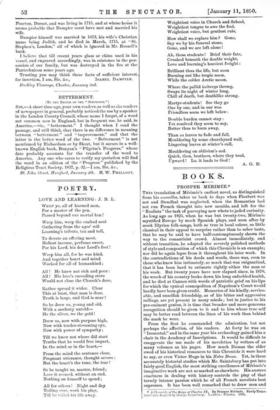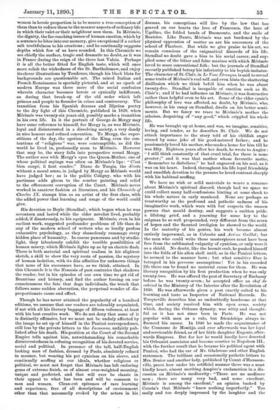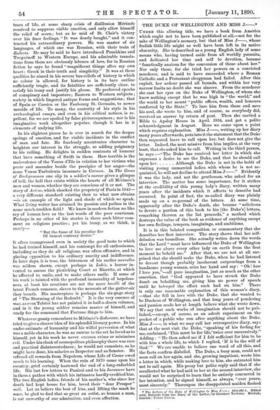BOOKS.
PROSPER MERIMEE.*
THIS translation of Merimee's earliest novel, as distinguished from his nouvelles, takes us back to days when Flaubert was not and Stendhal was neglected, when the Romantics had not run French thought into new moulds, and left for the- " Realists " the task of purveying new whets to jaded curiosity_ As long ago as 1825, when he was but twenty-two, Merimee mystified Europe by mock Spanish plays, and soon after by mock Illyrian folk-songs, both so true in local colour, so little- classical in their appeal to surprise rather than to sober taste,. that he may be said to have half-contemptuously shown the- way to the romanticist crowd. Almost immediately, and without transition, he adopted the severely polished methods. of style and composition of which this Chronicle is an example; nor did he again lapse from it throughout his later work. In• the contradictions of his deeds and words, there was, even to- those who knew him intimately, so much that was enigmatical, that it has been hard to estimate rightly either the man or his work. But twenty years have now elapsed since, in 1870, the wreck of his country broke down his long enfeebled health, and he died at Cannes with words of patriotic grief on his lips- for which the cynical cosmopolitan of Napoleon's Court would hardly have been given credit. Memories of his kindly, service- able, and unselfish friendship, as of his bitter and aggressive railings, are yet present in many minds ; but in justice to his pre-eminent genius, it is time that broader and more generous recognition should be given to it and to him whose true self may be better read between the lines of his work than behind_ the mask he wore.
From the first he commanded the admiration, but not perhaps the affection, of his readers. At forty he was an " Immortal," and in the same year his archaeology gained him a chair in the Academy of Inscriptions. It would be difficult to exaggerate the use made of his novelettes by writers of as many volumes as his pages. How much Dumas the elder owed of his historical romances to this Chronicle it were hard to say, or even Victor Hugo in his Notre Dame. Yet, in these accurately historial studies which Mr. Saintsbury has put into fairly good English, the most striking excellences of M4rim4e's imaginative work are not so marked as elsewhere. His austere exactness in dealing with history controls the play of that tersely intense passion which he of all French novelists best expresses. It has been well remarked that to draw men and • A Chronicle of the Reign of Charles II. By Prosper Mdrimee. Newly Trans- lated into itnglish by George Snintsbury. London : 7.Timmo. 1890. women in heroic proportion is to be nearer a true conception of them than to reduce them to the meaner aspects of ordinary life in which their valet or their neighbour sees them. In Merimee, the dignity, the far-reaching issues of human emotion, which by a sentence he bites into our memory, give exceptional if a rather salt truthfulness to his creations ; and he continually suggests -depths which few of us have sounded. In this Chronicle we see chiefly the surface, tragic and dramatic no doubt, as it was in France during the reign of the three last -Valois. Perhaps it is all the better fitted for English taste, which will once more relish the wickedness of the St. Bartholomew, and enjoy its clever illustrations by Toudouze, though his black blots for backgrounds are questionable art. The mixed Italian and French Renaissance is specially pictorial, and at no epoch of modern Europe was there more of the social confusion wherein character becomes heroic or cynically indifferent, as daring that break-up of the old order which left princes and people to flounder in crime and controversy. The transition from his Spanish dramas and Illyrian poetry to the dry light of this Chronicle, published in 1829, when Merimee was twenty-six years old, possibly marks a transition in his own life. In it the portrait of George de Mergy may have some reference to himself, for Mergy is, as was Merimee, loyal and disinterested in a dissolving society, a very dandy in nice honour and refined convention. To Mergy, the super- stitions of the day, the egotism of the King, even the con- tentions of " religious " war, were contemptible, as did the world he lived in, professedly seem to Merimee. However that may be, the story falls into perspective round Mergy. The author sees with Mergy's eyes the Queen-Mother, one of whose political sayings was often on Merimee's lips : " C'est bien coup& it faut coudre." Diane de Turgis, the devote without a moral sense, is judged by Mergy as Merimee would have judged her ; as is the politic Coligny, who with his partisans adds gloom to the sombre painting and relief to the efflorescent corruption of the Court. Merlin& never worked in amateur fashion at literature, and his Chronicle of Charles IX. stamps him as an artist of the first class, with the added power that learning and usage of the world could give.
His devotion to Beyle (Stendhal), which began when he was seventeen and lasted while the elder novelist lived, probably added, if disastrously, to his equipment. Merimee, even in his earliest work, suggested profounder problems of life than do any of the modern school of writers who so loudly profess exhaustive psychology, as they shamelessly rummage every hidden place of humanity. In coarse panorama and by studio- light, they laboriously exhibit the terrible possibilities of human misery, which Merimee lights up as by an electric flash. There is both material and spiritual realism in his slightest sketch, a skill to show the very roots of passion, the mystery of human isolation, with its dim affinities for unknown things that none of his successors have, as we think, attained. In this Chronicle it is the Nemesis of past centuries that shadows the reader, but in his episodes of our own time we get rid of Brantome and history, and find the author forcing on our consciousness the fate that dogs individuals, the wreck that follows some sudden aberration, the perpetual wonder of dis- proportionate cause and effect.
Though he has never attained the popularity of a hundred editions, we assume that our readers are tolerably acquainted, if not with all his literary baggage of fifteen volumes, at least with his best creative work. We do not deny that some of it is distinctly offensive, but we must not be unduly affected by the image he set up of himself in the Panizzi correspondence, still less by the private letters to the Inconnue, unfairly pub- lished after his death. His position at the Court of the Second Empire tells against him, notwithstanding his remarkable disinterestedness in refusing recognition of his devoted service, social and political. In presence of the tall, half-English looking man of fashion, dressed by Poole, absolutely refined in manner, but wearing his pet cynicism on his sleeve, and continually scoffing at our ideals, whether religious or political, we must not forget that Merina6e has left enduring gems of extreme finish, as of almost over-weighted meaning, unique and perfected, and that will ever be classic in their appeal to what has been and will be common to men and women. Clean-cut epitomes of rare learning and experience, free of all descriptions of environment other than that necessarily evoked by the actors in his
dramas, his conceptions will live by the law that has graved on our hearts the love of Francesca, the hate of Ugolino, the folded hands of Buonconte, and the smile of Beatrice. Like Dante, Merimee was not burdened by the physical oppression of matter as are his successors of the school of Flaubert. But while we give praise to his art, we remain conscious of the enigmatical discords of his life. Stendhal no doubt gave a bias to his social career, and sup- plied some of the bitter and false maxims with which Merimee loved to scare conventional folk ; but the journals of Stendhal recently published betray his inferiority to his boyish imitator. The character of St. Clair, in Le Vase Etrusque, is said to reveal some traits of Melimee's real self, and even hints the shattering disillusion which we think befell him when he was about twenty-five. Stendhal is incapable of emotion such as St.
; and if he had influence on Merimee, it was destructive rather than helpful even to his art. Some of the elder cynic's philosophy of love was affected, no doubt, by Merimee, who, however, in his essay on Stendhal, dwells on his better senti- ments. But we fancy we trace to Merimee's mother the atheism, despairing of "any good," which crippled his whole life.
He was brought up at home, and was, we imagine, sensitive, loving, and tender, as he describes St. Clair. We do not attach importance to the story told of his childish anger roused by some joke of his good-natured father; and he passionately loved his mother, who made a home for him till he was fifty. Eighteen years after her death, he wrote to Angier : I still think constantly of that cruel trial, for there is none greater ;" and it was that mother whose favourite motto, " Remember to disbelieve," he had engraved on his seal, as it was on his heart. Indeed, throughout his life loyal friendship and unselfish devotion to the persons he loved contrast sharply with his habitual scoffing.
We have no wish or solid materials to weave a romance about Merimee's spiritual discord, though had we space we could collect many half-confessions hinting at some shock to his whole nature in early manhood. None are perhaps so trustworthy as the profound and pathetic sadness of his imaginative work, which wars with but respects the unseen powers that mould destiny, and suggests a smitten pride, a lifelong grief, and a yearning for some key to the enigmas he so well propounded, very different from the scorn of hopes and the flaunted irreligion he showed to the world. In the maturity of his genius, his work became almost entirely impersonal, as in Colomba and Arsime G-uillot ; but the man who could write those masterpieces must have been free from the sublimated vulgarity of cynicism, or only wore it as a shield. No doubt, like the hermit crab, he pushed himself into the folds of his alien shell until, as in the Panizzi letters, he seemed to the manner born ; but what sensitive fibre is betrayed in his perverse assumptions ! Yet in his recorded life there can be found no material cause for them. He won literary recognition by his first production when he was only twenty-two. He was offered the post of Secretary of Embassy before he was twenty-seven ; he accepted office as chef de cabinet in the Ministry of the Interior after the Revolution of 1830. He was afterwards given a post exactly suited to his learning and taste as Inspector of National Records. De Tocqueville describes him as undoubtedly handsome at that time, and society received him with open arms, society which, during the Orleans dynasty, was witty and thought- ful as it has not since been in Paris. He was not popular with men as a rule, but friendships always in- fluenced his career. In 1840 he made the acquaintance of the Comtesse de Montijo, and ever afterwards was her loyal and serviceable friend, as of her little daughter Eugenie, after- wards Empress. But for her he would hardly have deserted his Orleanist associates and become courtier to Napoleon DM, with the further result that he became his political agent with Panizzi, who had the ear of Mr. Gladstone and other English statesmen. The brilliant and occasionally pathetic letters to Mrs. Senior and another lady, published by Count d'Hausson- vine, prove how under his artificial manner there was a most kindly heart, almost meriting Ampere's exclamation in a dis- cussion on Merimee's mediocrity : "There are no mediocre men ; there are many very bad, and some excellent. Merimee is among the excellent," an opinion backed by Cousin's that Merimee " knew nothing imperfectly." Too easily and too deeply impressed by the laughter and the
tears of life, at some sharp crisis of disillusion Merimee resolved to suppress visible emotion, and only allow himself the relief of scorn; but as he said of St. Clair's victory over his finer feelings, " It was dearly bought," and it con- tracted his extraordinary powers. He was master of six languages, of which one was Russian, with their train of dialects. He may be said to have introduced Poushkine and Turgueneff to Western Europe, and his admirable transla- tions from them are obviously labours of love, for in Russian fiction he says he found "magnificent things after my own heart : Greek in their truth and simplicity." It was at these qualities he aimed in his severe bas-reliefs of history in which no colour is allowed, for history is in its bare outline sufficiently tragic, and its fatalities are sufficiently clear, to satisfy his irony and justify his gloom. He preferred epochs of conspiracy and imposture; Eastern to Western subjects ; society in which lingered antique forms and suggestions; that of Spain or Corsica or the Faubourg St. Germain, to newer moulds of life. To many, the austerity of his style in his archaeological essays, and even in his critical notices, is re- pellent, for we are spoiled by false picturesqueness ; nor is his imaginative work altogether popular, though it has in it elements of undying life.
In his slightest pieces he is ever in search for the deeper springs of emotion, and for visible incidents in the conflict of man and fate. He fearlessly accentuates character to heighten our interest in the struggle, so adding poignancy to his railing. He delights in sudden contrasts of humour that have something of Swift in them. How terrible is the malevolence of the Venus d'Ille in relation to her victims who prate and maunder beside the precipice of her anger—the same Venus Turbulenta incarnate in Carmen. In The Game of Backgammon one slip in a soldier's career gives a glimpse of hell, the hell that exists within the hearts of all Merimee's men and women, whether they are conscious of it or not. The story of Arste, which shocked the propriety of Paris in 1843— a very different standard existing then to what now obtains —is an example of the light and shade of which we speak. What living writer has attained its passion and pathos in the same much-trodden field ? We know in modern fiction no like cry of human love as the last words of the poor courtesan. Perhaps in no other of his stories is there such bitter com- ment on religious practice ; yet his irony, as we think, is surely—
"But the fume of his peculiar fire Of inmost contrary desire."
It often transgressed even in society the good taste to which he had trained himself, and his contempt for all enthusiasms, including as they do all religions, was often offensive, and in glaring opposition to his ordinary suavity and indifference. In later days, it is true, the bitterness of his earlier nouvelles was seldom shown, except perhaps in Lokis, a horror in- vented to amuse the picnicking Court at Biarritz, at which he affected to smile, and to make others smile. If some of his work is tainted with the profound immorality of hopeless- ness, at least his creations are not the mere bacilli of the latest French romance, slaves to the neurosis of the gutter-air they breath. His masterpiece is perhaps the six-page story of " The Storming of the Redoubt." It is the very essence of war, as even Tolstoi has not painted it in half-a-dozen volumes, and in it the young soldier remains master of himself, and ready for the command that Fortune flings to him.
Whatever gossip remembers to Merimee's disfavour, we have tried to give a clearer idea of his splendid literary power. In his under-estimate of humanity and his wilful perversion of what was a noble character, he was as untrue to the art he loved as to himself, yet in his work he never excuses crime or minimises evil. Under his cloak of cosmopolitan philosophy there was rare and practical disinterestedness ; he would not cumulate, as he might have done, his salaries as Inspector and as Senator. He refused all rewards from Napoleon, whose Life of Omar owed much to his learning. When the ruin of 1870 came upon his country, grief certainly hastened the end of a long-enfeebled life. His last few letters to Panizzi and to his Inconnue have in them a pathos with which his intimates hardly credited him. The two English ladies, friends of his mother's, who since her death had kept house for him, loved their "dear Prosper" well. Let us believe the best of him, and lifting the mask he wore, be glad to find that so great an artist, so human a man, is not unworthy of our admiration, and even affection.








































 Previous page
Previous page